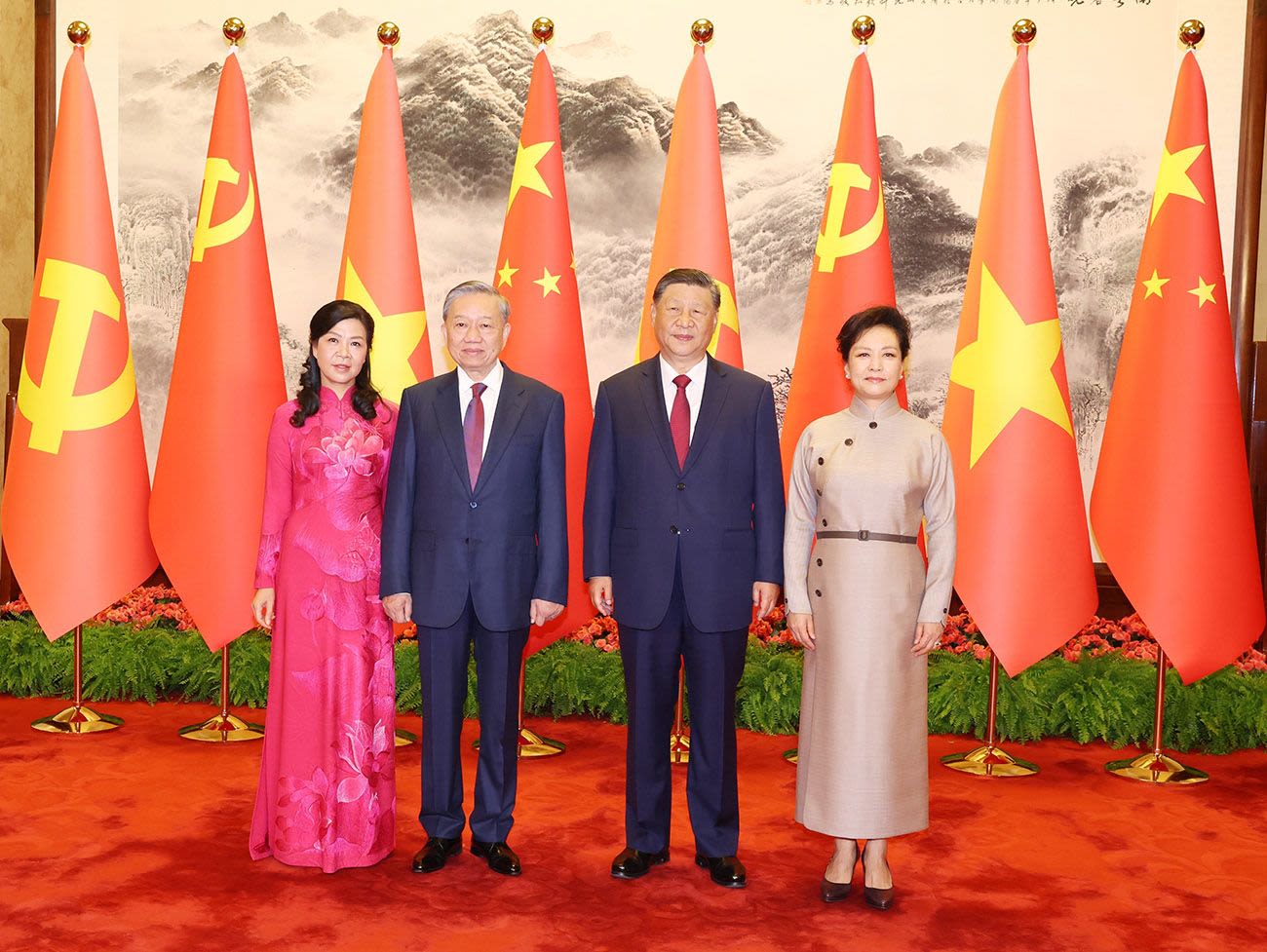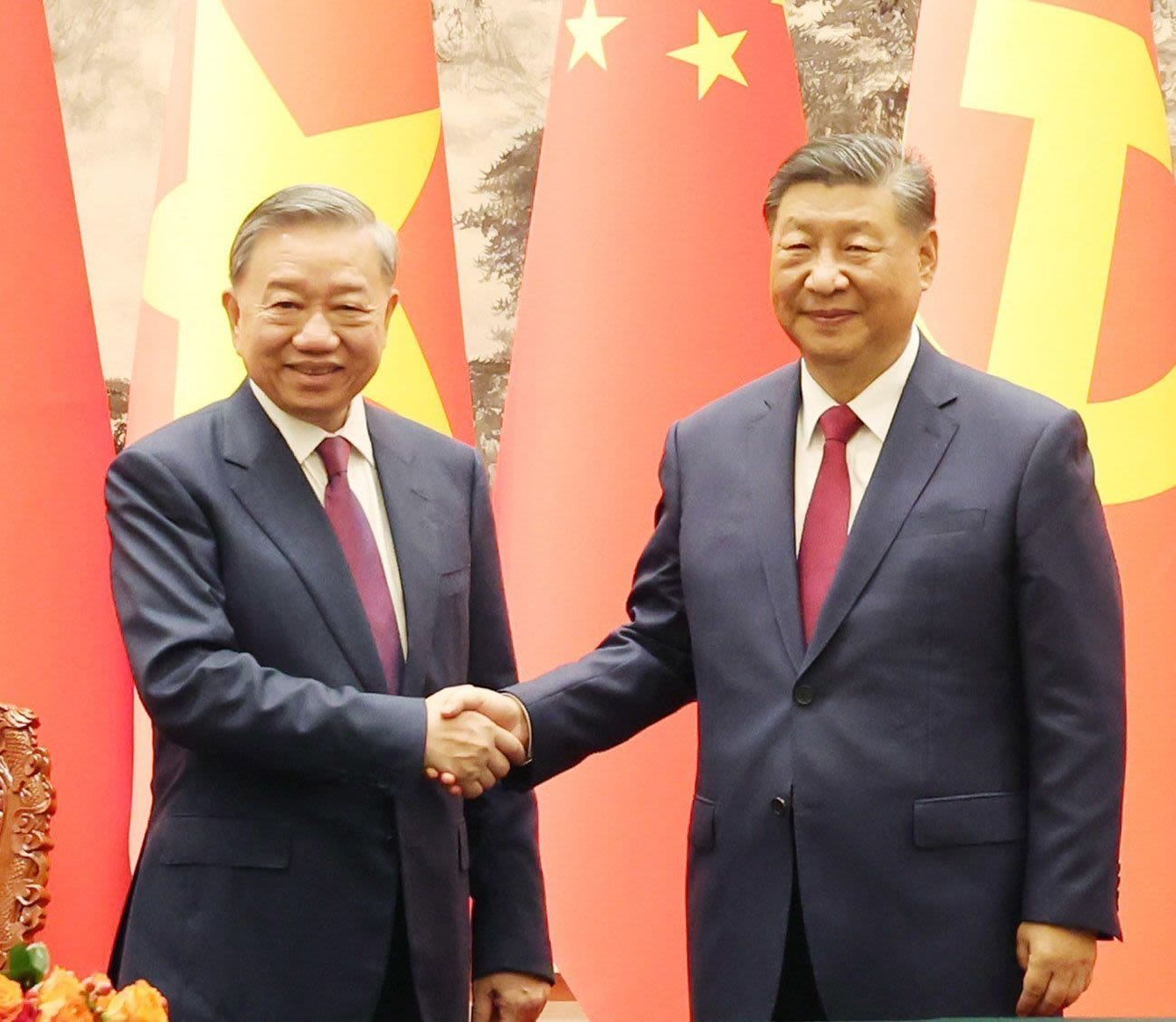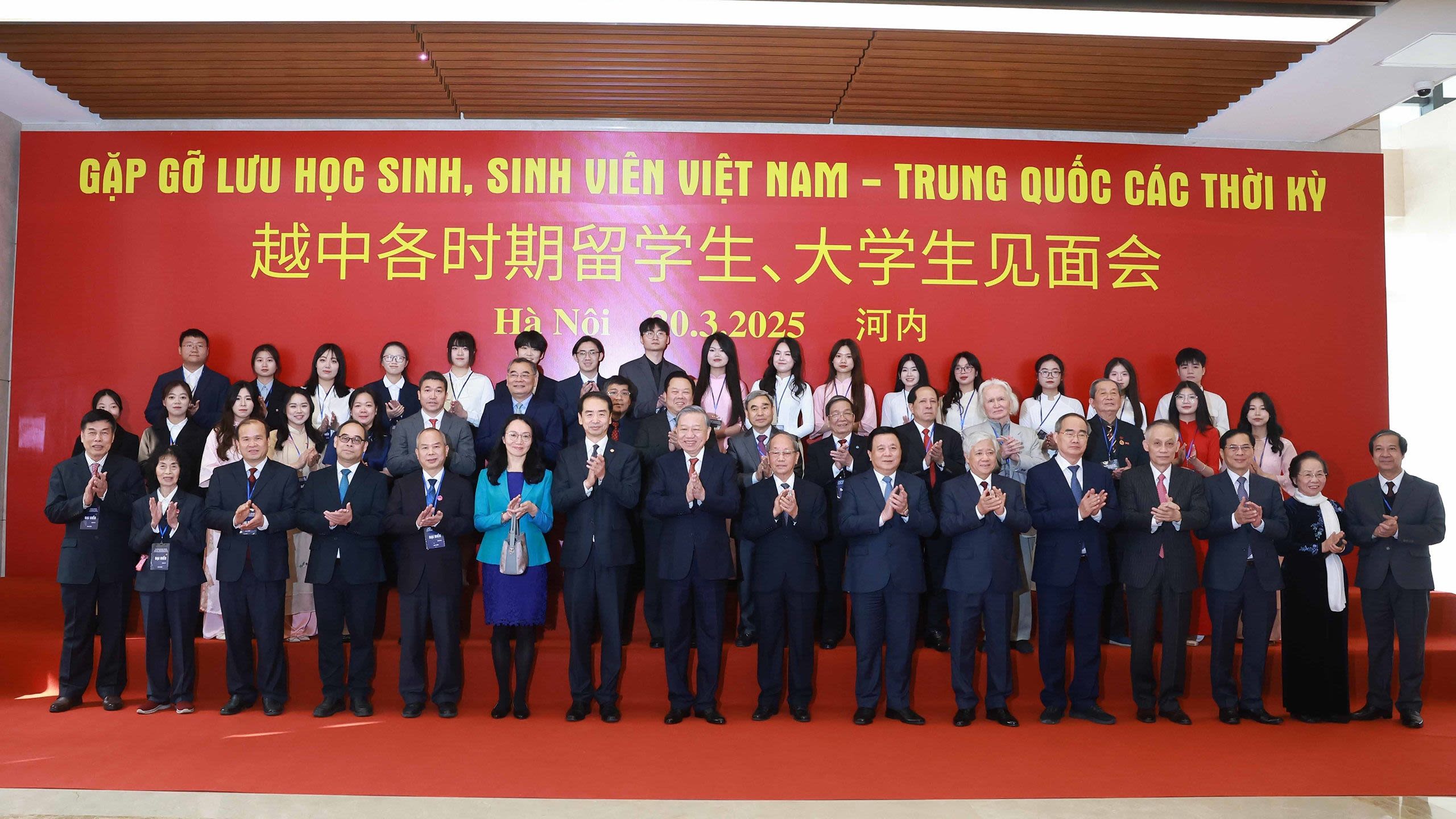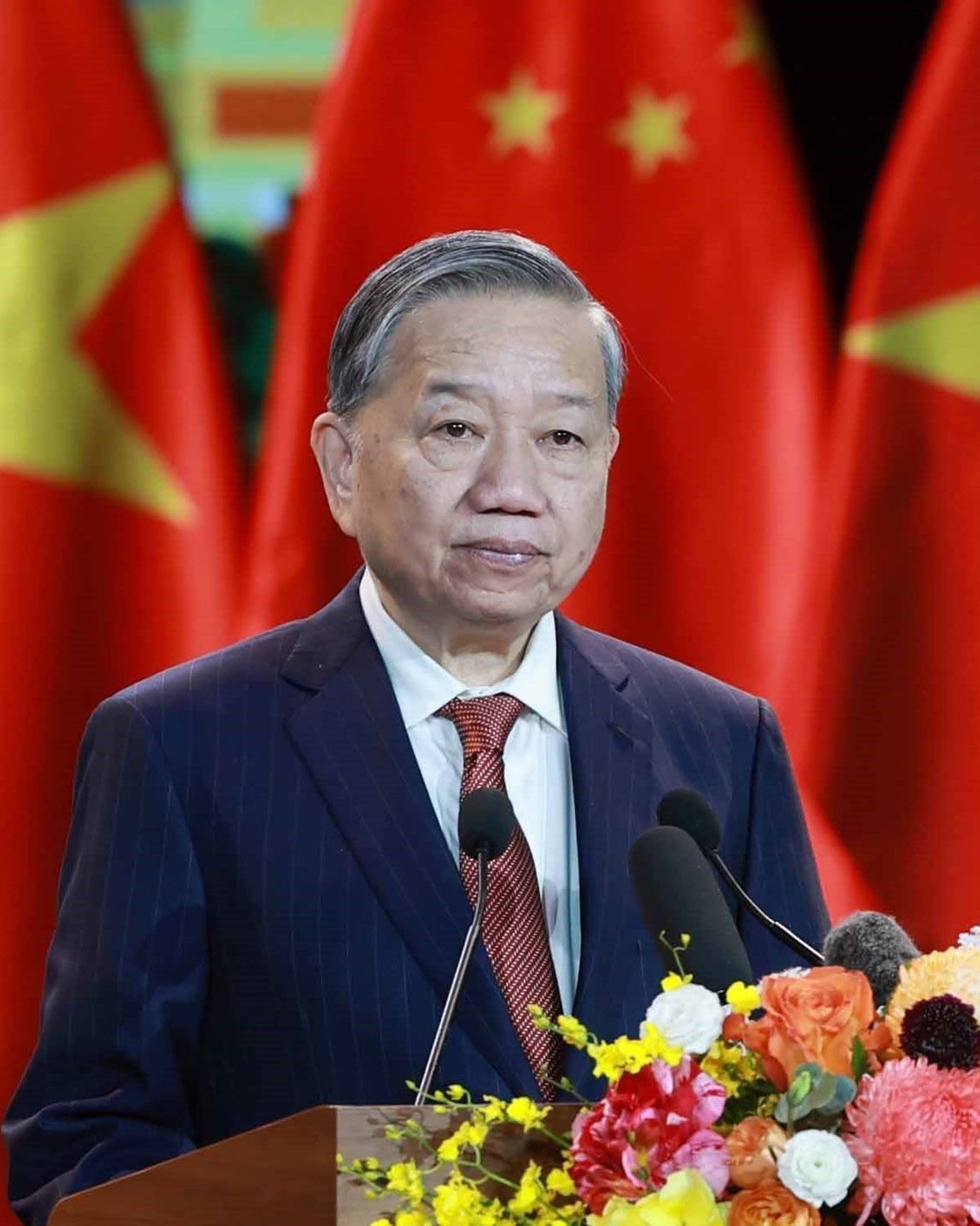
At the invitation of General Secretary of the Communist Party of Vietnam (CPV) To Lam and Vietnamese President Luong Cuong, General Secretary of the Communist Party of China (CPC) and Chinese President Xi Jinping will pay a state visit to Vietnam from April 14-15.
This is Xi’s fourth state visit to Vietnam as Chinese General Secretary and President, and his second visit during the tenures of the 13th CPV National Congress and the 20th CPC National Congress. The visit comes less than a year since General Secretary To Lam’s successful state visit to China. The visit is even more significant as it is made in the Year of Vietnam-China People-to-People Exchange, which marks the 75th anniversary of bilateral ties (1950-2025).
I believe that besides continuing and maintaining mutual visits between the highest leaders of the two parties and countries in recent years, Xi’s visit this time will leave a historic mark, providing a strong impetus and creating a favourable foundation for the development of the relationship between the two parties and two countries in the new phase. It will continue to outline strategic arrangements and important directions, causing Vietnam-China relations to continue to develop in a steady and robust manner, gaining many breakthrough achievements for the development benefits of both countries.
- Vietnamese Ambassador to China
Pham Thanh Binh
Chinese General Secretary and President Xi Jinping and his wife in a photo with Vietnamese General Secretary and President To Lam and his wife on August 19, 2024. (Photo: VNA)
Chinese General Secretary and President Xi Jinping and his wife in a photo with Vietnamese General Secretary and President To Lam and his wife on August 19, 2024. (Photo: VNA)
The friendship cultivated by President Ho Chi Minh and Chairman Mao Zedong, along with generations of leaders of both countries, has become a precious common asset of the Vietnamese and Chinese peoples, helping to maintain the stable development trend of traditional Vietnam-China friendly relations, bringing practical benefits to the people of both countries.
Throughout the 75-year journey since the establishment of diplomatic relations, Vietnam-China relations have experienced ups and downs, but friendship and cooperation have remained the mainstream. The two parties, two countries, and their peoples have stood shoulder to shoulder, offering each other tremendous and valuable support and assistance and contributing to the success of the revolutionary cause of national liberation and the cause of national construction and development in each country. Notably, since the normalisation of relations in 1991, relations between the two parties and countries have continuously developed to new heights, achieving many important milestones.
After Vietnam and China issued a Joint Statement in December 2023 on further deepening and elevating their comprehensive strategic cooperative partnership and building a community with a shared future between the two countries with strategic significance, Vietnam–China relations have followed a more favourable trajectory, with clear and comprehensive progress, based on six major orientations. This development has been assessed by both sides as the best since the relations were normalised.
Vietnam’s position in its relationship with China has been enhanced. China has demonstrated clear prioritisation and respect for its ties with Vietnam. General Secretary and President of China Xi Jinping has paid close attention to the development of Vietnam–China relations, becoming the top Chinese leader with the most visits to Vietnam in history. Political trust between the two general secretaries has been further consolidated, most recently reflected in the state visit to China by General Secretary and President of Vietnam To Lam in August 2024, and the phone call between the top leaders of the two Parties in January 2025.

According to Vietnamese Ambassador to China Pham Thanh Binh, the recent historic mutual visits by the top leaders of the two parties and states have set the direction for advancing Vietnam–China relations into a new, comprehensive, and sustainable stage of development, guided by the six major directions.
In the first three months of 2025, bilateral trade between Vietnam and China reached 51.25 billion USD, up 17.46% compared to the same period. Regarding investment, in 2024, China topped the number of newly licensed projects at 955 and ranked third out of 110 investment partners in Vietnam in terms of capital, with 4.73 billion USD up over 3.05%. As of December 31, 2024, China remained sixth among the 148 countries and territories investing in Vietnam, with 5,111 valid projects and total registered capital of 30.83 billion USD, accounting for more than 6.2% of Vietnam’s total registered FDI. Chinese investors have invested in 19 out of 21 sectors with FDI capital and are present in 55 out of Vietnam’s 63 provinces and cities. In March 2025, China ranked second in total registered capital, totalling 1.23 billion USD, accounting for 28.5%.
In tourism, Vietnam welcomed 3.74 million Chinese visitor arrivals in 2024, up 114% against 2023, accounting for 21.26% of total international arrivals to the country, ranking second, after the Republic of Korea. In the first quarter of 2025, Vietnam greeted 1.58 million Chinese visitor arrivals, up 178% compared to the same period, making China the top source market for international arrivals to Vietnam.
People-to-people exchanges and cooperation in tourism and culture between the two countries have been thriving.
The two leaders at the signing ceremony of cooperation documents between the two countries in Beijing on August 19, 2024. (Photo: VNA)
The two leaders at the signing ceremony of cooperation documents between the two countries in Beijing on August 19, 2024. (Photo: VNA)
Chinese media have repeatedly affirmed that the Vietnam-China relationship has developed positively and sustainably in line with the needs of the two countries and their peoples. According to Vietnam News Agency, in an interview with the Global Times, Professor Phan Kim Nga from the Chinese Academy of Social Sciences said that the Communist Party of China and the Communist Party of Vietnam have built a close relationship since the early stages of the Party's establishment, with similarities in beliefs and ideals. This traditional friendship has a long history, demonstrating the deep friendship, mutual assistance, and joint exploration of the path to national development between the people of the two countries.
Yu Xiangdong, Director of the Institute of Vietnam Studies at Zhengzhou University (China), emphasised that Vietnam's foreign policy towards China is part of the overall foreign policy and national development strategy, with strategic needs for socio-economic development and national modernisation as well as political requirements to adhere to the socialist orientation and the leadership of the Party. In the complex context of the current world, both China and Vietnam wish to promote the development and prosperity of the world economy and the globalisation process.

Last March, the Ministry of Foreign Affairs chaired and coordinated with the Vietnam Union of Friendship Organisations, Vietnam Television, and Vietnam News Agency to organise the Vietnam-China alumni gathering to mark the occasion of 75 years of diplomatic relations between the two countries along with the “Year of Vietnam – China Humanistic Exchange 2025”.
General Secretary To Lam attends the Vietnam-China alumni gathering in Hanoi on March 20, 2025. (Photo: VNA)
General Secretary To Lam attends the Vietnam-China alumni gathering in Hanoi on March 20, 2025. (Photo: VNA)
Speaking at the programme, General Secretary To Lam emphasised that this is an opportunity to share about the Vietnam-China friendship, especially to convey the message about the role and determination of students of the two countries through the periods in promoting the vision for the new era of development of each party and each country as well as the relationship between the two brotherly nations.
Pleased to see that the youth of the two countries are effectively playing their role as "young cultural ambassadors" and bridges connecting friendship, General Secretary To Lam said that the young generation has always received special attention from the leaders of the two parties and the two countries of Vietnam and China and is expected to inherit the tradition of friendship, bringing strong vitality and a bright future to the Vietnam-China relationship; the young generation of the two countries is the core force in developing the Vietnam-China relationship well and truly effectively and sustainably in the long term.
General Secretary To Lam offered several suggestions for the youth and younger generations of the two countries.
- Firstly, it is necessary to raise a deep awareness of the historical depth, important significance and strategic height of the Vietnam-China relationship, the youth of the two countries have the honour and responsibility to continue and elevate the relationship between the two countries to new heights.
- Secondly, it is necessary to make efforts to study, practice, and master science and technology to contribute to the industrialisation, modernisation, and development of new productive forces in each country, thereby strengthening the material foundation of the bilateral relationship.
- Thirdly, it needs to innovate communications and education for the younger generation about the traditional Vietnam-China friendship, promote practical and effective exchange and cooperation programs, effectively communicating and orienting public opinion among young people, and enhancing student exchanges and cooperation in education and training.
Meanwhile, reviewing the major milestones in the history of the friendship between the two parties and the two countries, Chinese Ambassador to Vietnam He Wei expressed his hope that the younger generation, overseas Vietnamese, and Chinese students will continue to inherit, preserve, and promote the traditional friendship — a precious common asset of the two peoples.
The visit is an opportunity for high-level leaders of the two Parties and two countries to continue to in-depth strategic exchanges, evaluate the relationship between the two parties and two countries, especially the results achieved in implementing high-level common agreements, and determine major directions and measures to promote the relationship between the two parties and the two countries of Vietnam and China to develop more stably, substantially and effectively in the coming time.
- Vietnamese Ambassador to China
Pham Thanh Binh
Welcoming General Secretary and President of China Xi Jinping on his state visit to Vietnam is a foreign activity of extreme importance and long-term significance for the relationship between the two parties and two countries; affirming the foreign policy of the 13th National Party Congress and Resolution No. 34-NQ/TW of the Politburo on a number of major orientations and policies to implement the foreign policy of the 13th National Party Congress; and affirming the importance and top priority of both countries in consolidating the Vietnam-China relationship to develop firmly, stably, and sustainably, for the benefit of both countries.
Published: April, 2025
Directed by: Chu Hong Thang - Pham Truong Son
Content: Minh Hang - Nguyen Ha
Presentation: Nha Nam
Source: MOFA, VNA
Translated by: NDO






